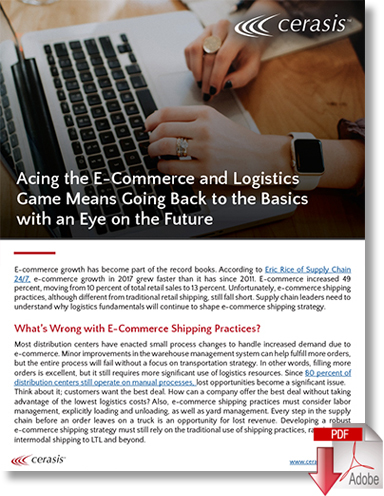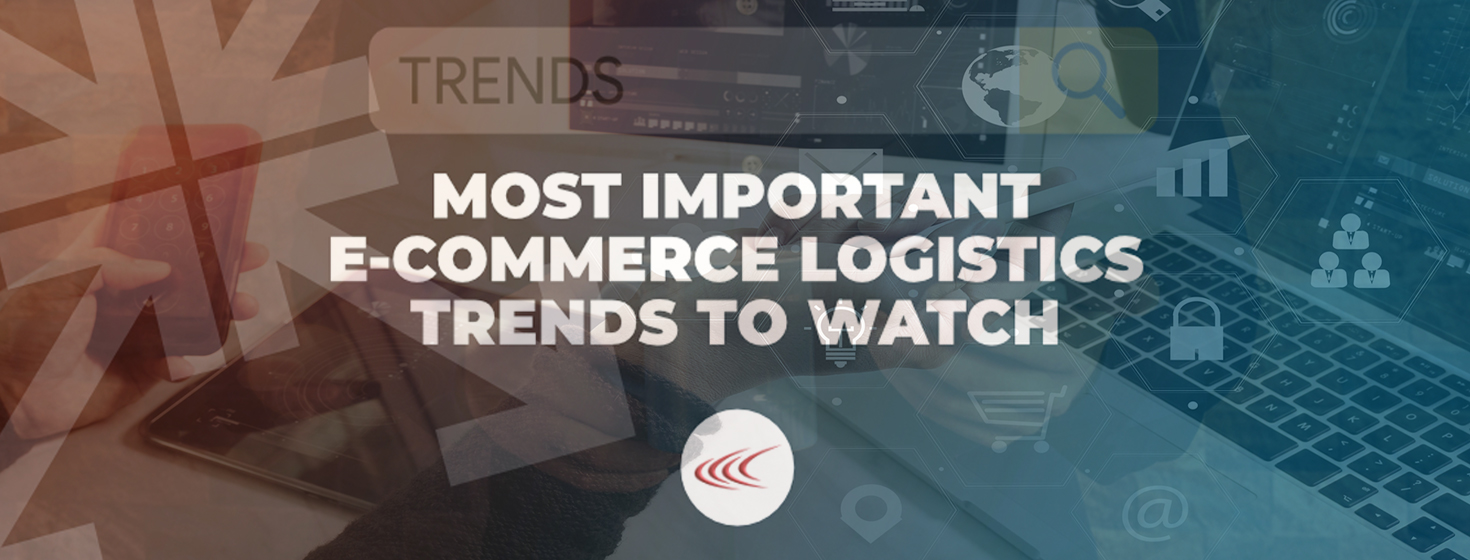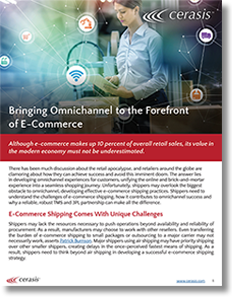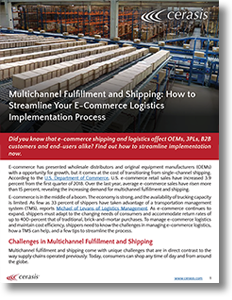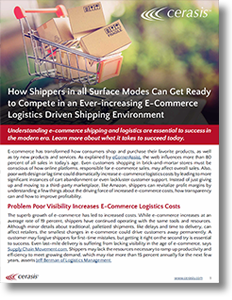The Role of Transportation Technology for Shippers to Kill It at E-Commerce Logistics
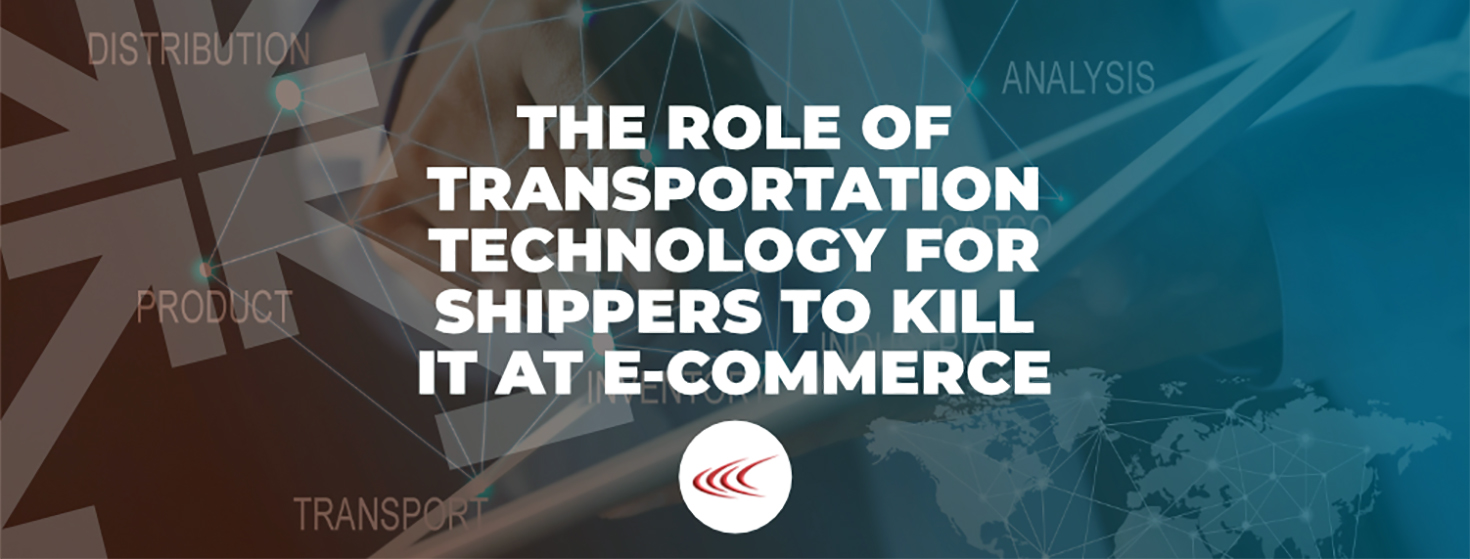
Failure to use a transportation management system or tms as part of an e-commerce logistics strategy contributes to higher freight spend by limiting shipping capacity and forcing shippers to continue with spot rates among carriers.
Growth of E-Commerce
E-commerce is growing faster than ever, and more consumers are leveraging online platforms in making purchasing decisions.
In fact, two-thirds of consumer shopping journeys include internet research, reports McKinsey & Company, as well as word-of-mouth recommendations and past experiences.
According to the research brief “The Importance of TMS within Ecommerce,” e-commerce is on track to become the dominating force in all sales.
By 2020, the value of B2B e-commerce will surpass $1 trillion, and manufacturers, distributors, retailers, reverse logistics managers, third-party freight brokers and logistics services providers are working to keep up with the trend.
E-Commerce is Spurring Record Growth in Logistics
E-commerce has made it impossible to meet the status quo with traditional technologies, and still, some shippers have not yet implemented e-commerce and TMS solutions.
Transportation managers are spending upward of 80 percent of working hours just looking for available shipping capacity, reports Talking Logistics, reflecting a portion of companies that have not leveraged the power of a Transportation Management System (TMS).
Unfortunately, failure to use a TMS contributes to higher freight spend by limiting shipping capacity and forcing shippers to continue with spot rates among carriers.
This has the added effect of limiting the number of orders a shipper can fulfill and reducing brand value, creating severe consequences and increasing risk of the Retail Apocalypse coming to the forefront of the e-commerce world for shippers seeking to enter it in the first place.
E-Commerce and TMS Are Key to Success
The use of TMS in e-commerce allows shippers to leverage all modes of transportation, critical during peak shipping times and through the ongoing capacity crunch.
A TMS provides an extra opportunity to find the most cost-effective shipping options, and with e-commerce affecting 96 percent of all shippers, the need to leverage the benefits of e-commerce and TMS connectivity.
In other words, e-commerce and TMS use must become a single part of an effective logistics strategy.
The Benefits of Deploying Transportation Technology in E-Commerce
Deploying a TMS opens the door to lower-than-advertised freight rates, unique, value-added services and more.
Understanding how a TMS leverages technology and experience of the TMS vendor, such as Cerasis, is an integral step in adapting to the needs of e-commerce shipping and fulfillment.
- Better forecasting for inventory management and logistics demand through analytics, preventing backorders. Analytics can be applied to move product, manufacturing, and fulfillment to other locations and meet demand. This also enables real-time inventory management, the transition to lean, just-in-time inventory management practices and reduced carrying costs as well.
- Machine learning identifies patterns and minimizes the risk of disruptions. Machine learning may reduce maintenance spend, increase labor productivity and enable faster, more effective collaboration.
- Automated shipment tracking provides peace of mind to shippers and consumers. Automating shipping tracks eliminates much of the hassle of maintaining end-to-end visibility and lowering transportation costs.
- Dynamic routing tools use real-time data to move product faster, such as avoiding traffic delays and adverse weather asserts Roberto Michel of Logistics Management. This is where a TMS truly begins to prove its value.
- Digitized freight forwarding, enabling faster, more cost-effective global trade. International trade can be filled with weeks-long delays, so digitizing the process with TMS speeds approval and cross-border trade.
- Secure and faster last-mile delivery through innovative delivery solutions, like privatized last-mile delivery services and concierge services. Such services can reduce delays in final mile delivery and reduce costs of multiple delivery attempts.
- Superior customer service and freight management in-house and outsourced services, including managed freight cargo insurance claims and invoice auditing to prevent instances of over- or double-billing. As explained by Eric Johnson of the Journal of Commerce, vendors are already working to create invoice-settlement tools to allow finance departments to reconcile invoices with inventory data and reduce overhead spend.
Putting It All Together
As the world becomes more entrenched in e-commerce and 24/7 shopping and shipping, shippers must evolve.
Since traditional supply chains were built on moving big, palletized shipments across long distances, e-commerce shipping must redesign their operations and leverage new technologies to stay effective.
The combination of e-commerce and TMS will help shippers meet this goal, creating positive customer experiences, increasing customer retention rates, expanding operations, and fulfilling more orders to meet the growing demands of a global consumer base.
It is also important to remember that consumers include B2B consumers, so success through e-commerce and TMS integration is crucial.
Related Article: Important E-Commerce Logistics Trends to Watch in 2019
Related Ecommerce White Papers
Acing the E-Commerce and Logistics Game Means Going Back to the Basics with an Eye on the Future
In this white paper, you will learn what supply chain leaders need to understand why logistics fundamentals will continue to shape the e-commerce shipping strategy and how to master e-commerce logistics. Download Now!
Bringing Omnichannel to the Forefront of Ecommerce
This white paper is a must read for those who are looking to go omnichannel with their supply chain and want to understand that a major part of that strategy is in the ecommerce channel. Download Now!
Multichannel Fulfillment & Shipping: Streamlining Your Ecommerce Logistics Implementation Process
This white paper is a must read for those shippers of larger freight and surface freight who are wanting to open channels, such as direct to consumer by using e-commerce, beyond traditional ones. Download Now!
How Shippers Can Compete in an Ecommerce Logistics Driven Shipping Environment
Understanding ecommerce shipping and logistics are essential to success in the modern era, this white paper details what it takes for shippers in all surface modes to compete and succeed in today's ecommerce logistics driven shipping environment. Download Now!
More Resources from Cerasis
Article Topics
Cerasis News & Resources
GlobalTranz Appoints Executive Chairman Bob Farrell as Chief Executive Officer Amazon’s Drone Delivery Hits Milestone with Federal Aviation Administration Clearance Digital Supply Chain: The Landscape, Trends, Types, and the Application in Supply Chain Management Walmart’s Bid for TikTok Could Benefit the Retail Giant’s Ecommerce and Advertising Businesses The State of Ecommerce Logistics Heading into 2020 Peak Delivery Season Bringing Omnichannel to the Forefront of Ecommerce FedEx’s Fred Smith Optimistic About Economic Recovery as Ecommerce Business Booms More CerasisLatest in Transportation
Talking Supply Chain: Doomsday never arrives for Baltimore bridge collapse impacts Amazon Logistics’ Growth Shakes Up Shipping Industry in 2023 Nissan Channels Tesla With Its Latest Manufacturing Process Why are Diesel Prices Climbing Back Over $4 a Gallon? Luxury Car Brands in Limbo After Chinese Company Violates Labor Laws The Three Biggest Challenges Facing Shippers and Carriers in 2024 Supply Chain Stability Index: “Tremendous Improvement” in 2023 More Transportation

